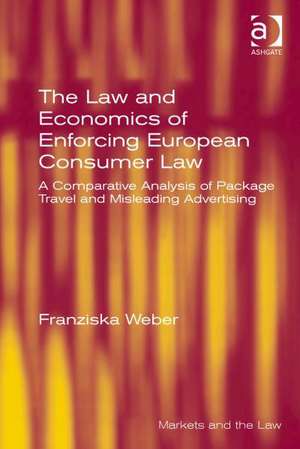The Law and Economics of Enforcing European Consumer Law: A Comparative Analysis of Package Travel and Misleading Advertising: Markets and the Law
Autor Franziska Weberen Limba Engleză Hardback – 22 mai 2014
| Toate formatele și edițiile | Preț | Express |
|---|---|---|
| Paperback (1) | 263.36 lei 43-57 zile | |
| Taylor & Francis – 14 oct 2024 | 263.36 lei 43-57 zile | |
| Hardback (1) | 1061.36 lei 43-57 zile | |
| Taylor & Francis – 22 mai 2014 | 1061.36 lei 43-57 zile |
Din seria Markets and the Law
-
 Preț: 303.39 lei
Preț: 303.39 lei - 18%
 Preț: 1000.27 lei
Preț: 1000.27 lei - 16%
 Preț: 338.33 lei
Preț: 338.33 lei -
 Preț: 469.34 lei
Preț: 469.34 lei - 16%
 Preț: 338.33 lei
Preț: 338.33 lei -
 Preț: 469.34 lei
Preț: 469.34 lei -
 Preț: 329.88 lei
Preț: 329.88 lei - 14%
 Preț: 338.33 lei
Preț: 338.33 lei - 19%
 Preț: 258.30 lei
Preț: 258.30 lei - 18%
 Preț: 700.75 lei
Preț: 700.75 lei -
 Preț: 392.60 lei
Preț: 392.60 lei - 16%
 Preț: 263.36 lei
Preț: 263.36 lei - 18%
 Preț: 259.98 lei
Preț: 259.98 lei -
 Preț: 449.41 lei
Preț: 449.41 lei -
 Preț: 436.18 lei
Preț: 436.18 lei - 12%
 Preț: 301.13 lei
Preț: 301.13 lei -
 Preț: 416.22 lei
Preț: 416.22 lei -
 Preț: 389.29 lei
Preț: 389.29 lei -
 Preț: 381.98 lei
Preț: 381.98 lei - 16%
 Preț: 262.14 lei
Preț: 262.14 lei -
 Preț: 367.45 lei
Preț: 367.45 lei - 21%
 Preț: 257.94 lei
Preț: 257.94 lei
Preț: 1061.36 lei
Preț vechi: 1294.35 lei
-18% Nou
Puncte Express: 1592
Preț estimativ în valută:
203.12€ • 211.27$ • 167.68£
203.12€ • 211.27$ • 167.68£
Carte tipărită la comandă
Livrare economică 14-28 aprilie
Preluare comenzi: 021 569.72.76
Specificații
ISBN-13: 9781472417046
ISBN-10: 1472417046
Pagini: 336
Dimensiuni: 156 x 234 x 19 mm
Greutate: 0.64 kg
Ediția:Revised.
Editura: Taylor & Francis
Colecția Routledge
Seria Markets and the Law
Locul publicării:Oxford, United Kingdom
ISBN-10: 1472417046
Pagini: 336
Dimensiuni: 156 x 234 x 19 mm
Greutate: 0.64 kg
Ediția:Revised.
Editura: Taylor & Francis
Colecția Routledge
Seria Markets and the Law
Locul publicării:Oxford, United Kingdom
Public țintă
AcademicNotă biografică
Jun. Prof. Dr. Franziska Weber is Junior Professor for Civil Law and Law and Economics at the University of Hamburg, Germany.
Cuprins
Preface; Chapter 1 Introduction; Part 1 Optimal Enforcement Mixes (Analysis); Chapter 2 Existing Enforcement Mechanisms; Chapter 3 Framework to Assess Enforcement Designs; Chapter 4 Assessing Strengths and Weaknesses of Existing Law Enforcement Systems; Chapter 5 Combining Enforcement Mechanisms Efficiently for Specific Case Scenarios; Part 2 Country Studies (Comparison); Chapter 6 The Netherlands; Chapter 7 Sweden; Chapter 8 England; Part 3 Conclusions; Chapter 9 Conclusions;
Recenzii
’Until recently, consumer policy has mainly focussed on enabling consumer choice by requiring traders to inform consumers properly. Whether this policy is actually effective has not obtained much attention. This topical book fills that gap by focussing on the enforcement of consumer protection laws from the perspective of law and economics.’ Marco B.M. Loos, University of Amsterdam, Netherlands 'Weber’s study - very convincingly - advocates a mixture of public and private law elements for the enforcement of consumer rights. The selected cases offer wonderful examples of the various objectives which legislatures must keep in mind, and her profound economic analysis offers well-balanced solutions which should be taken into account by lawmakers when considering new efforts for the protection of consumer rights.' Astrid Stadler, University of Konstanz, Germany
Descriere
This book offers a comparative law and economics analysis of the changing landscape of EU consumer law enforcement policy now that EU member states are moving away from purely public or private law enforcement towards a more mixed approach. The book reflects on the need for efficient enforcement designs and examines the economic factors according to which the efficiency of different enforcement mechanisms can be assessed. A variety of hypothetical case scenarios are considered to illustrate various consumer law problems and the findings are used to assess real life situations in countries with different enforcement traditions.









